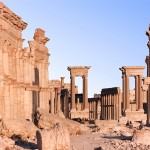 This is a straightforward history, largely military and administrative in orientation, of two cities, Palmyra and Dura Europus, which acted as buffer states and trading centers between the Roman and Parthian empires. Both flourished in the second and third centuries A.D., growing wealthy on trade between the Mediterranean and the Persian Gulf. The Palmyrenes maintained a crack army of archers, who specialized in protecting caravans. The safety they provided made their city extremely wealthy. What interests me is that Palmyra had a fully operational boule and demos on the classical Greek model.
This is a straightforward history, largely military and administrative in orientation, of two cities, Palmyra and Dura Europus, which acted as buffer states and trading centers between the Roman and Parthian empires. Both flourished in the second and third centuries A.D., growing wealthy on trade between the Mediterranean and the Persian Gulf. The Palmyrenes maintained a crack army of archers, who specialized in protecting caravans. The safety they provided made their city extremely wealthy. What interests me is that Palmyra had a fully operational boule and demos on the classical Greek model.
It’s conventional to dismiss any form of urban democracy in such a late period as a degenerate leftover from earlier times. Democratic institutions died, we are told, with the arrival of the Great Empires, and anything that looks like them must be a hollow ghost, not a dynamic idea. Given Palmyra’s history, this interpretation doesn’t seem plausible. Palmyra was never a Greek city. It’s inhabitants were semitic, and its earlier governing institutions were said to be an alliance of 16 semitic tribes. The boule and demos structure was adopted at the time when Parthian and Roman influences were strong, long after the Seleucids had departed. The Roman Emperor Hadrian visited the city, and the Palmyrenes were careful to enact a tariff structure congenial to Rome, but there was no question of Rome interfering in the city’s internal governance. No Roman political terms or customs were adopted. The terminology and institutions were entirely Classical Greek, and not some Hellenistic hodgepodge derived from the Seleucids. This would indicate to me that we cannot interpret this kind of governance among the Palmyrenes as being any kind of “leftover” or impotent formality carried over by unthinking, habitual Hellenism. More likely, democratic ideas remained available to city-dwellers in many places, and where conditions were favourable, such as in a prosperous trading center that the large empires found strategically necessary to leave to their own affairs, they could be called up and employed. I think that we will eventually come to realize that there is a significant element of continuity in democratic ideas from Antiquity onwards, much to the contrary of current orthodoxy on the matter.
image: ruins of Palmyra
0 Comments.